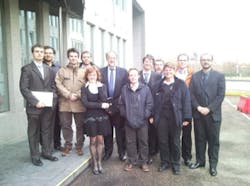European organizations invest millions in model-based methods, tools for avionics and surveillance embedded systems in aerospace and defense
MILAN, Italy, 29 Nov. 2011. The Open Group has partnered with a consortium of European real-time technology developers, industrial manufacturers, and research organizations to develop a new model-based, software-development framework for complex real-time systems in aerospace and defense. The Model-based Methods and Tools for Avionics and Surveillance Embedded Systems (MADES) project, supported by the European Commission, is investing more than $5.1 million (over €3.5 million) to develop an advanced framework covering all phases of real-time systems development—from design to code generation and deployment.
The platform-independent framework will maintain the robust reliability essential for safety- and mission-critical applications, while providing improvements in developer productivity, reusability of code, and lower costs for maintenance and retargeting to newer multi-core platforms.
The strategic objective of the MADES project is to develop new model-based verification and simulation methods, along with new model-based, code-generation methods and tools that will address conventional programming languages and hardware description languages. The MADES tools will provide developers the ability to more easily reuse existing software components, ensure consistency of complex systems, and exploit advanced multicore hardware platforms.
Led by TXT e-solutions, an Aerospace and Defense engineering company, the MADES consortium includes The Open Group; University of York; Polytechnic University of Milan; Cassidian, an EADS company and maker of global security solutions and systems; and Softeam, an embedded systems technology supplier specializing in tools for advanced model-driven architectures. Softeam is directing the research to ensure the MADES project results meet the highest level of standards for reliability and real-time performance within the industry.
“Embedded systems developers require new tools and methods based on recognized standards to design complex applications utilizing model-driven development methods,” says Flavio Fusetti, director of Aerospace & Defense Business at TXT e-solutions. “The MADES project will provide an evolutionary path that integrates existing development methods providing a way forward to more advanced model-based design. These development techniques will also enable real-time systems developers to achieve higher performance levels, greater reliability, and scalability with increasingly sophisticated multi-core platforms.”
The MADES tools and technologies will be integrated into a single framework that provides a seamless environment for modeling, validation, and code generation of avionic and surveillance solutions.
With the imminent arrival of the new avionics standard DO-178C (Software Considerations in Airborne Systems and Equipment Certification) later this year, embedded systems developers will be able to adopt model-driven methods that will dramatically improve the way safety-critical systems are developed, says a representative.
“The MADES consortium partners are experts in each phase of model-driven systems development. This project will bring new innovations to the process of transforming software designs into deployable systems that have the required reliability and assurances for safety-critical applications,” explains David Lounsbury, chief technical officer at The Open Group. “We’re confident the powerful, model-based tools already being evaluated by industrial partners will allow applications developers to be more productive and manage expected increases in system complexity.”
The MADES project is financed in part by the 7th Framework Programme, an initiative of the European Community created to foster European research and development of new technologies, applications, and industries. The project will run through mid-2012 and is expected to contribute to ongoing standards development activities related to unified modeling language (UML) and modeling and analysis of real-time and embedded (MARTE) systems.
